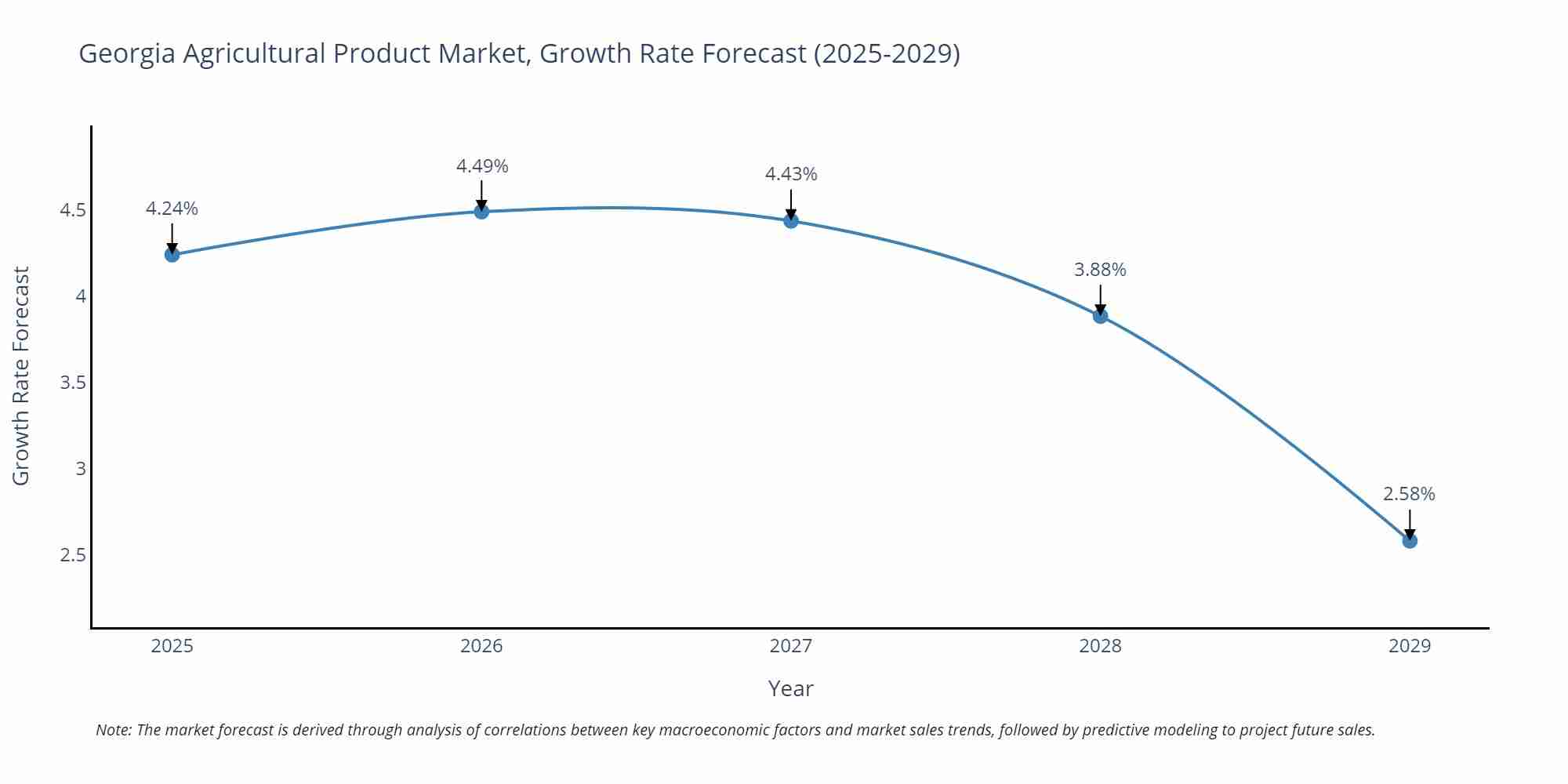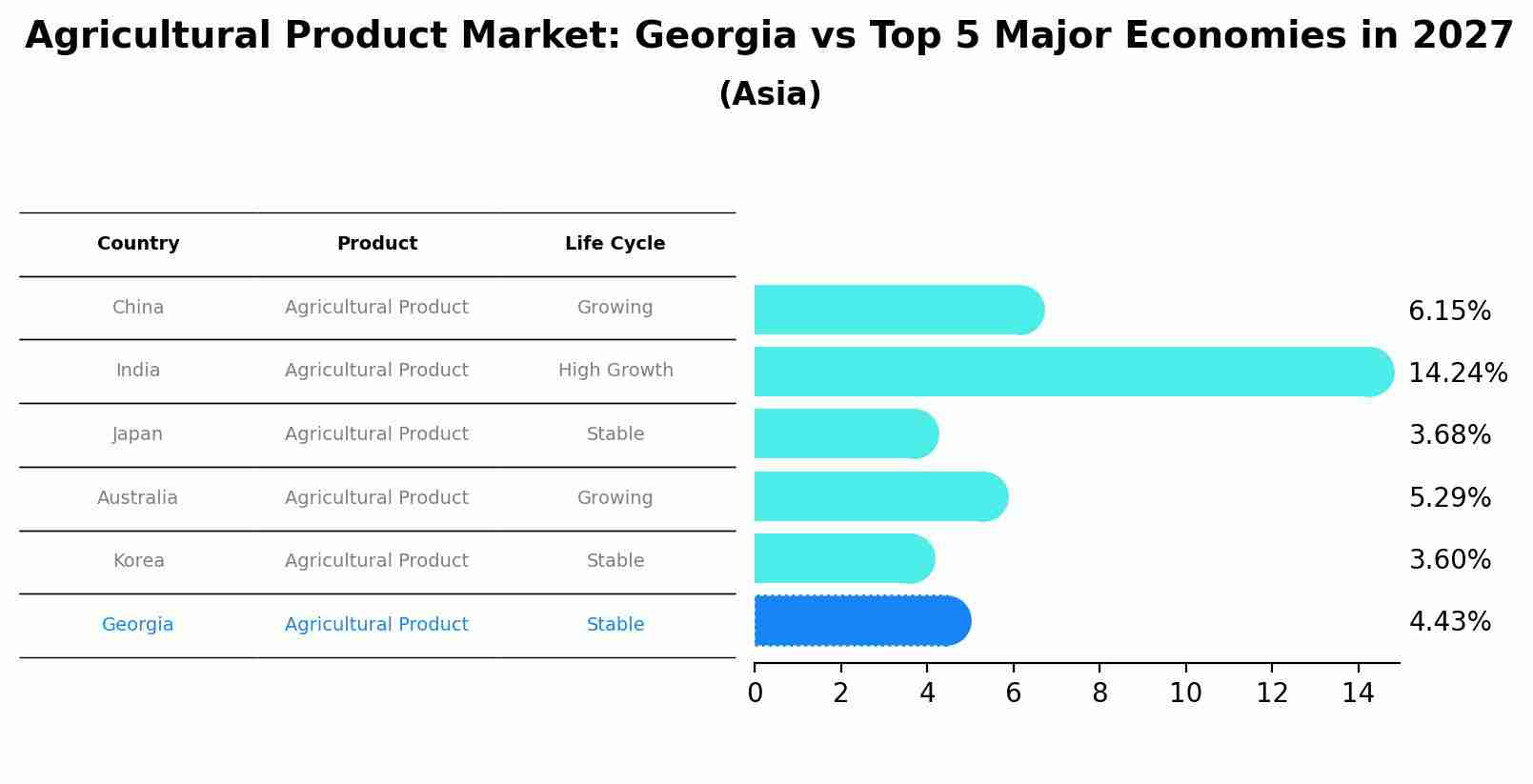Georgia Agricultural Product Market (2025-2031) Outlook | Companies, Share, Revenue, Size, Analysis, Forecast, Growth, Value, Trends & Industry
| Product Code: ETC379680 | Publication Date: Aug 2022 | Updated Date: Jul 2025 | Product Type: Market Research Report | |
| Publisher: 6Wresearch | Author: Bhawna Singh | No. of Pages: 75 | No. of Figures: 35 | No. of Tables: 20 |
Georgia Agricultural Product Market Size Growth Rate
The Georgia Agricultural Product Market is projected to witness mixed growth rate patterns during 2025 to 2029. The growth rate begins at 4.24% in 2025, climbs to a high of 4.49% in 2026, and moderates to 2.58% by 2029.

Agricultural Product Market: Georgia vs Top 5 Major Economies in 2027 (Asia)
The Agricultural Product market in Georgia is projected to grow at a stable growth rate of 4.43% by 2027, highlighting the country's increasing focus on advanced technologies within the Asia region, where China holds the dominant position, followed closely by India, Japan, Australia and South Korea, shaping overall regional demand.

Georgia Agricultural Product Market Synopsis
The Georgia Agricultural Product Market is a diverse and thriving sector that encompasses a wide range of products including poultry, peanuts, blueberries, pecans, and cotton. Georgia is a leading producer of broiler chickens in the United States and is known for its high-quality peanuts and pecans. The state`s mild climate and fertile soil make it ideal for growing a variety of fruits and vegetables, with blueberries being a particularly significant crop. In addition, Georgia`s cotton industry plays a crucial role in the state`s economy. The agricultural product market in Georgia is supported by a strong network of farmers, processors, distributors, and retailers, contributing significantly to the state`s overall economy and providing valuable products to both domestic and international markets.
Georgia Agricultural Product Market Trends
The Georgia Agricultural Product Market is witnessing several key trends. One prominent trend is the increasing focus on sustainability and organic practices, with more farmers adopting eco-friendly methods to meet consumer demand for healthier and environmentally-friendly products. Another trend is the rise of technology in agriculture, with the use of precision farming techniques, drones, and data analytics to improve efficiency and productivity. Additionally, there is a growing interest in niche and specialty crops, such as blueberries, pecans, and specialty vegetables, as consumers seek unique and high-quality products. The market also sees a strong emphasis on local food production and direct-to-consumer sales, with farmers markets and farm-to-table initiatives gaining popularity. Overall, these trends reflect a shift towards more sustainable, technology-driven, and diversified agricultural practices in Georgia.
Georgia Agricultural Product Market Challenges
In the Georgia agricultural product market, some key challenges include fluctuating weather patterns leading to unpredictable crop yields, increasing competition from imported products, rising production costs, and limited access to technology and infrastructure in rural areas. Additionally, changing consumer preferences and demands for organic and sustainably grown products pose a challenge for traditional producers who may need to adapt their practices. Furthermore, issues related to water availability and quality, labor shortages, and government regulations also impact the market. To remain competitive and sustainable, stakeholders in the Georgia agricultural product market need to focus on innovation, diversification, and strategic partnerships to address these challenges effectively.
Georgia Agricultural Product Market Investment Opportunities
Investment opportunities in the Georgia Agricultural Product Market include areas such as poultry and livestock farming, fruit and vegetable production, and agribusiness technology. Georgia is one of the leading states in the US for poultry production, with companies like Tyson Foods and Pilgrim`s Pride operating in the region. Additionally, the state`s climate and fertile soil make it conducive for growing a variety of fruits and vegetables, including peaches, blueberries, and Vidalia onions. Investing in agribusiness technology companies that provide innovative solutions for farmers, such as precision agriculture tools or crop monitoring systems, also presents a promising opportunity in the Georgia market. Overall, the diverse agricultural landscape in Georgia offers investors a range of opportunities to capitalize on the state`s thriving agricultural sector.
Jordan Agar Market Government Policies
The Georgia Agricultural Product Market is influenced by various government policies aimed at supporting farmers and promoting the growth of the agricultural sector. Some key policies include the Georgia Agricultural Tax Exemption (GATE) Program, which provides tax exemptions on agricultural inputs for qualified farmers, thereby reducing production costs. The state also offers grants and financial assistance programs to support agricultural innovation and market development. Additionally, Georgia has regulations in place to ensure food safety and quality standards are met, contributing to consumer confidence in locally produced agricultural products. Overall, these government policies play a crucial role in sustaining the competitiveness and viability of the Georgia Agricultural Product Market.
Georgia Agricultural Product Market Future Outlook
The future outlook for the Georgia Agricultural Product Market appears promising, driven by factors such as increasing demand for locally sourced and organic produce, technological advancements in farming practices, and a growing interest in sustainable agriculture. Georgia`s diverse climate and fertile soil provide a conducive environment for a wide variety of crops, positioning the state as a key player in the agricultural industry. With a focus on innovation and sustainability, Georgia farmers are likely to leverage technology such as precision agriculture and vertical farming to increase productivity and efficiency. Additionally, the state`s strategic location and strong transportation infrastructure enable easy access to markets, both domestic and international, further enhancing the growth potential for the Georgia Agricultural Product Market. Overall, the market is expected to continue expanding and evolving in the coming years, presenting opportunities for farmers and businesses in the sector.
Key Highlights of the Report:
- Georgia Agricultural Product Market Outlook
- Market Size of Georgia Agricultural Product Market, 2024
- Forecast of Georgia Agricultural Product Market, 2031
- Historical Data and Forecast of Georgia Agricultural Product Revenues & Volume for the Period 2021 - 2031
- Georgia Agricultural Product Market Trend Evolution
- Georgia Agricultural Product Market Drivers and Challenges
- Georgia Agricultural Product Price Trends
- Georgia Agricultural Product Porter's Five Forces
- Georgia Agricultural Product Industry Life Cycle
- Historical Data and Forecast of Georgia Agricultural Product Market Revenues & Volume By Type for the Period 2021 - 2031
- Historical Data and Forecast of Georgia Agricultural Product Market Revenues & Volume By Food for the Period 2021 - 2031
- Historical Data and Forecast of Georgia Agricultural Product Market Revenues & Volume By Fiber for the Period 2021 - 2031
- Historical Data and Forecast of Georgia Agricultural Product Market Revenues & Volume By Fuel for the Period 2021 - 2031
- Historical Data and Forecast of Georgia Agricultural Product Market Revenues & Volume By Raw Material for the Period 2021 - 2031
- Historical Data and Forecast of Georgia Agricultural Product Market Revenues & Volume By Application for the Period 2021 - 2031
- Historical Data and Forecast of Georgia Agricultural Product Market Revenues & Volume By Direct Consumption for the Period 2021 - 2031
- Historical Data and Forecast of Georgia Agricultural Product Market Revenues & Volume By Food & Fabrics for the Period 2021 - 2031
- Historical Data and Forecast of Georgia Agricultural Product Market Revenues & Volume By Construction & Paper Products for the Period 2021 - 2031
- Historical Data and Forecast of Georgia Agricultural Product Market Revenues & Volume By Others for the Period 2021 - 2031
- Historical Data and Forecast of Georgia Agricultural Product Market Revenues & Volume By Industry Vertical for the Period 2021 - 2031
- Historical Data and Forecast of Georgia Agricultural Product Market Revenues & Volume By Food & Nutrition for the Period 2021 - 2031
- Historical Data and Forecast of Georgia Agricultural Product Market Revenues & Volume By Sustainable Agribusiness for the Period 2021 - 2031
- Historical Data and Forecast of Georgia Agricultural Product Market Revenues & Volume By Production & Harvesting for the Period 2021 - 2031
- Historical Data and Forecast of Georgia Agricultural Product Market Revenues & Volume By Agribusiness Technological Inputs for the Period 2021 - 2031
- Historical Data and Forecast of Georgia Agricultural Product Market Revenues & Volume By Others for the Period 2021 - 2031
- Georgia Agricultural Product Import Export Trade Statistics
- Market Opportunity Assessment By Type
- Market Opportunity Assessment By Application
- Market Opportunity Assessment By Industry Vertical
- Georgia Agricultural Product Top Companies Market Share
- Georgia Agricultural Product Competitive Benchmarking By Technical and Operational Parameters
- Georgia Agricultural Product Company Profiles
- Georgia Agricultural Product Key Strategic Recommendations
Frequently Asked Questions About the Market Study (FAQs):
- Single User License$ 1,995
- Department License$ 2,400
- Site License$ 3,120
- Global License$ 3,795
Search
Thought Leadership and Analyst Meet
Our Clients
Related Reports
- Afghanistan Apparel Market (2026-2032) | Growth, Outlook, Industry, Segmentation, Forecast, Size, Companies, Trends, Value, Share, Analysis & Revenue
- Canada Oil and Gas Market (2026-2032) | Share, Segmentation, Value, Industry, Trends, Forecast, Analysis, Size & Revenue, Growth, Competitive Landscape, Outlook, Companies
- Germany Breakfast Food Market (2026-2032) | Industry, Share, Growth, Size, Companies, Value, Analysis, Revenue, Trends, Forecast & Outlook
- Australia Briquette Market (2025-2031) | Growth, Size, Revenue, Forecast, Analysis, Trends, Value, Share, Industry & Companies
- Vietnam System Integrator Market (2025-2031) | Size, Companies, Analysis, Industry, Value, Forecast, Growth, Trends, Revenue & Share
- ASEAN and Thailand Brain Health Supplements Market (2025-2031) | Strategy, Consumer Insights, Analysis, Investment Trends, Opportunities, Growth, Size, Share, Industry, Revenue, Segments, Value, Segmentation, Supply, Forecast, Restraints, Outlook, Competition, Drivers, Trends, Demand, Pricing Analysis, Competitive, Strategic Insights, Companies, Challenges
- ASEAN Bearings Market (2025-2031) | Strategy, Consumer Insights, Analysis, Investment Trends, Opportunities, Growth, Size, Share, Industry, Revenue, Segments, Value, Segmentation, Supply, Forecast, Restraints, Outlook, Competition, Drivers, Trends, Demand, Pricing Analysis, Competitive, Strategic Insights, Companies, Challenges
- Europe Flooring Market (2025-2031) | Outlook, Share, Industry, Trends, Forecast, Companies, Revenue, Size, Analysis, Growth & Value
- Saudi Arabia Manlift Market (2025-2031) | Outlook, Size, Growth, Trends, Companies, Industry, Revenue, Value, Share, Forecast & Analysis
- Uganda Excavator, Crane, and Wheel Loaders Market (2025-2031) | Strategy, Consumer Insights, Analysis, Investment Trends, Opportunities, Growth, Size, Share, Industry, Revenue, Segments, Value, Segmentation, Supply, Forecast, Restraints, Outlook, Competition, Drivers, Trends, Demand, Pricing Analysis, Competitive, Strategic Insights, Companies, Challenges
Industry Events and Analyst Meet
Whitepaper
- Middle East & Africa Commercial Security Market Click here to view more.
- Middle East & Africa Fire Safety Systems & Equipment Market Click here to view more.
- GCC Drone Market Click here to view more.
- Middle East Lighting Fixture Market Click here to view more.
- GCC Physical & Perimeter Security Market Click here to view more.
6WResearch In News
- Doha a strategic location for EV manufacturing hub: IPA Qatar
- Demand for luxury TVs surging in the GCC, says Samsung
- Empowering Growth: The Thriving Journey of Bangladesh’s Cable Industry
- Demand for luxury TVs surging in the GCC, says Samsung
- Video call with a traditional healer? Once unthinkable, it’s now common in South Africa
- Intelligent Buildings To Smooth GCC’s Path To Net Zero


















